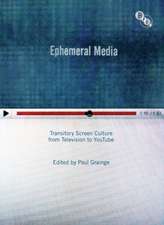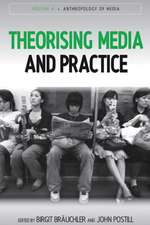The History of the Provincial Press in England
Autor Rachel Matthewsen Limba Engleză Paperback – 17 mai 2017
| Toate formatele și edițiile | Preț | Express |
|---|---|---|
| Paperback (1) | 193.18 lei 3-5 săpt. | |
| Bloomsbury Publishing – 17 mai 2017 | 193.18 lei 3-5 săpt. | |
| Hardback (1) | 832.00 lei 6-8 săpt. | |
| Bloomsbury Publishing – 17 mai 2017 | 832.00 lei 6-8 săpt. |
Preț: 193.18 lei
Preț vechi: 223.68 lei
-14% Nou
Puncte Express: 290
Preț estimativ în valută:
36.96€ • 38.60$ • 30.52£
36.96€ • 38.60$ • 30.52£
Carte disponibilă
Livrare economică 25 martie-08 aprilie
Preluare comenzi: 021 569.72.76
Specificații
ISBN-13: 9781441162304
ISBN-10: 1441162305
Pagini: 256
Ilustrații: 4 bw illus
Dimensiuni: 152 x 229 x 22 mm
Greutate: 0.43 kg
Editura: Bloomsbury Publishing
Colecția Bloomsbury Academic
Locul publicării:New York, United States
ISBN-10: 1441162305
Pagini: 256
Ilustrații: 4 bw illus
Dimensiuni: 152 x 229 x 22 mm
Greutate: 0.43 kg
Editura: Bloomsbury Publishing
Colecția Bloomsbury Academic
Locul publicării:New York, United States
Caracteristici
Proves the significance of the regional newspaper industry to the origins of the journalism industry.
Notă biografică
Rachel Matthews is Principal Lecturer in Journalism at Coventry University, UK. She spent 15 years in the regional newspaper industry, rising to the position of Deputy Editor.
Cuprins
PrefaceList of tables and illustrationsChapter 1: IntroductionThe provincial press: the contemporary conundrumEditorial workers in the provincial pressThe 'national' versus 'provincial' dichotomy examinedReappraising the provincial pressChapter 2: Printers Papers Re-imagining the early provincial newspaper The newspaper's place in the commercial landscape Early ventures in the newspaper industryEstablishing a market: 'freshest advices' and circulation The reader, cure-alls and books Advertising and profitThe emergence of local journalismChapter 3: Provincial press and politicsThe political bent Politics and the battle for a Free PressCommunities of interest and ProfitIndustrialisation: demarcation and news workThe good of the community and representationChapter 4: New Journalism The emergence of 'news'The development of news presentation as a sales techniqueThe influence of New Journalism on content and productionNew Journalism and the Midland Daily Telegraph Commercial success as an organising factor Chapter 5: The corporitisation of the provincial press.The Growth of Chain Control The consolidation of ownership: pattern and processLord Rothermere: ambition and resistanceNewspaper costs as a driver for consolidationConsolidation of ownership: Royal Commissions Commercial practice and the good of the community Chapter 6: Provincial Press and World War TwoConflict is good news for newspapersThe provincial press and the community in World War OnePublishing in the face of the adversity of World War TwoThe business of newspaper publishing in wartimeThe Provincial Press and Morale Chapter 7: The deunionisation of the provincial pressNew TechnologyThe changing motivations for newspaper ownership.Rising costs and competition. Computerisation. The legacy of new technology: working practices and content. Chapter 8: The Digital TurnInterpreting the crisis in local news? Digital beginningsRedefining the provincial press in a digital age.Where now the future for local news?BibliographyIndex
Recenzii
Anyone interested in how the past affects the future of newspapers will enjoy this book. Professors of graduate classes in media history, international journalism, culture and change, or political discourse in the media might assign this thoroughly researched study.
This is a radical, historical reassessment of a much-neglected media form. Dismissing nostalgia for a 'Golden Age', Matthews' persuasive polemic argues that the digital turn in provincial news may yet see it return to journalism's foundational myth of serving the interests of the community.
In this very well-researched, well-written exploration of the provincial press in England, Rachel Mathews compels us to rethink the relationship of media companies to society. At the core of the relationship, she argues, is not the public interest or good of the community, but the profit motive. This is a very thought-provoking read that takes use outside the media centers to where the rest of us live.
Rachel Matthews' new book offers a wonderfully insightful, scholarly, comprehensive and highly readable, historical account of the intriguing twists and turns which have characterized the development of the Provincial Press in England. Her analysis highlights the impact of changing media technologies as well as economic, social, cultural, political and ideological factors and their consequences for the local and regional press.Studies of the provincial press have too often suffered a curious and inexplicable scholarly neglect, but no more! The History of the Provincial Press in England offers a landmark study of local newspapers from the early publication of the Daily Courant in 1702, to the more recent 'digital turn', the advent of hyperlocalism, and online local editions.As an ex-local journalist turned scholar, Dr Matthews' book will be of great interest to everyone interested in the future of local journalism and developments in journalism studies.
This thoughtful and much needed one volume history of provincial press in England will stimulate researchers and students to attend more closely to an important, and under studied, area of media history. It should be read by anyone interested in the subject.
Rachel Matthews has given us an intelligent and sweeping history of provincial newspapers in England. Her narrative of successive business models is also an extended meditation on the importance and dangers of commercialization and the tensions between market forces and the democratic expectations that the press at every level is fraught with. Her book is a welcome complement to the accounts of the British national press offered by scholars like Martin Conboy and James Curran. It is thoughtful, smart, and readable, and anyone who is interested in the history of the press in Britain should read it.
This is a radical, historical reassessment of a much-neglected media form. Dismissing nostalgia for a 'Golden Age', Matthews' persuasive polemic argues that the digital turn in provincial news may yet see it return to journalism's foundational myth of serving the interests of the community.
In this very well-researched, well-written exploration of the provincial press in England, Rachel Mathews compels us to rethink the relationship of media companies to society. At the core of the relationship, she argues, is not the public interest or good of the community, but the profit motive. This is a very thought-provoking read that takes use outside the media centers to where the rest of us live.
Rachel Matthews' new book offers a wonderfully insightful, scholarly, comprehensive and highly readable, historical account of the intriguing twists and turns which have characterized the development of the Provincial Press in England. Her analysis highlights the impact of changing media technologies as well as economic, social, cultural, political and ideological factors and their consequences for the local and regional press.Studies of the provincial press have too often suffered a curious and inexplicable scholarly neglect, but no more! The History of the Provincial Press in England offers a landmark study of local newspapers from the early publication of the Daily Courant in 1702, to the more recent 'digital turn', the advent of hyperlocalism, and online local editions.As an ex-local journalist turned scholar, Dr Matthews' book will be of great interest to everyone interested in the future of local journalism and developments in journalism studies.
This thoughtful and much needed one volume history of provincial press in England will stimulate researchers and students to attend more closely to an important, and under studied, area of media history. It should be read by anyone interested in the subject.
Rachel Matthews has given us an intelligent and sweeping history of provincial newspapers in England. Her narrative of successive business models is also an extended meditation on the importance and dangers of commercialization and the tensions between market forces and the democratic expectations that the press at every level is fraught with. Her book is a welcome complement to the accounts of the British national press offered by scholars like Martin Conboy and James Curran. It is thoughtful, smart, and readable, and anyone who is interested in the history of the press in Britain should read it.















